|
Best Film Speeches and Monologues
|
|
Title Screen
|
Film Title/Year and Description of Film Speech/Monologue |
Screenshots
|

|
Shock Corridor (1963)
Screenwriter: Samuel Fuller
 An
Incendiary "America for Americans" Rant, Delivered by an African-American! An
Incendiary "America for Americans" Rant, Delivered by an African-American!
Writer/director Samuel Fuller's raw B-movie was
a psycho-drama with shocking, exploitative subject matter (xenophobia,
racism, hate and violence). It used the setting of a madhouse
as a harsh commentary upon Cold War America.
One of the inmates
in the mental institution, Trent (Hari Rhodes) - was originally
a black civil rights pioneer (he had been the first Negro student
to integrate into a Southern university: "a guinea pig in a
classroom"), but now crazily carried a sign: ("Integration
And Democracy Don't Mix"). He was suffering delusions-
he believed that he was the white supremacist, Grand Wizard
founder of the Ku Klux Klan.
Believing that he was the Klan leader - he stood
on a bench in the asylum's corridor and delivered an incendiary
hate-filled, racist rant about returning 'America to Americans'
to a group of patients:
"If Christ walked
the streets of my hometown, he'd be horrified. You've never seen
so many black people cluttering up our schools and buses and
cafes and washrooms! I'm for pure Americanism! White supremacy!
Listen to me, Americans. America for Americans. We got to throw
rocks and hurl bombs. Black bombs for black foreigners. So they
like hot music, do they? Well, we'll give them a crescendo they'll
never forget. Burn that freedom bus. Burn those freedom riders!
Burn any man who serves them at a lunch counter. Burn every dirty,
nigger-lovin' pocketbook integrationist! Collect a lot of blackjacks
and good long lengths of pipe. We'll show those rabble-rousers
they can't breathe our white air, and go to school with our white
children. We'll get some infallible liquid and pour it on 'em.
We'll pour it on their homes and burn 'em. Pour it on their pickaninnies
and set them on fire. Call out the members of the White Citizens
Council. Call out the KKK! Yes, we'll sponsor the Africans north!
Get rid of every black mother, son and daughter! America for
Americans...Keep our schools white!...I'm against Catholics!...Against
Jews!...Against niggers!...Against niggers!...Against niggers!..."
At the end of his speech,
Trent (with the pillow case with eye-slits on his head) fomented
a chase after another black patient-inmate by pointing him out:
"There's one! Let's get that black boy before
he marries my daughter!"
He caused a full-scale riot when the
group joined him and attacked.
|
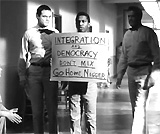
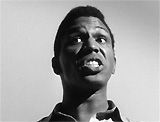
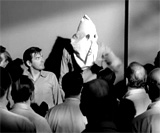
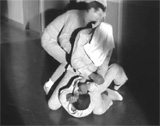
|
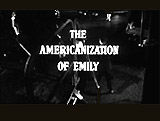
|
The Americanization of Emily
(1964)
Screenwriter(s): Paddy Chayefsky
 Debunking
the Anti-American Prejudices of a European Debunking
the Anti-American Prejudices of a European
Charming, scheming American Navy officer, Lt.
Cmdr. Charles E. Madison (James Garner), a "dog-robber" instructed
to make sure the generals were supplied (with everything from
Hershey bars to Cokes), spoke to British motor-pool ambulance
driver Miss Emily Barham (Julie Andrews) about her anti-American
prejudices (what he termed: "sentimental contempt"):
You American-haters bore me to tears, Miss
Barham. I've dealt with Europeans all my life. I know all
about us parvenus from the States who come over here and
race around your old cathedral towns with our cameras and
Coca-Cola bottles... Brawl in your pubs, paw your women,
and act like we own the world. We over-tip. We talk too
loud. We think we can buy anything with a Hershey bar.
I've had Germans and Italians tell me how
politically ingenuous we are. And perhaps so. But we haven't
managed a Hitler or Mussolini yet. I've had Frenchmen call
me a savage because I only took half an hour for lunch. Hell,
Miss Barham, the only reason the French take two hours for
lunch is because the service in their restaurants is lousy.
The most tedious lot are you British. We crass Americans
didn't introduce war into your little island. This war, Miss
Barham, to which we Americans are so insensitive, is the
result of 2,000 years of European greed, barbarism, superstition,
and stupidity. Don't blame it on our Coca-Cola bottles. Europe
was a going brothel long before we came to town.
Thinking he was "a complete rascal," she
responded:
"Dear me, what an outburst!" He quipped: "So lay
off, Mrs. Miniver. If you don't like our Hershey bars, don't
take 'em." |
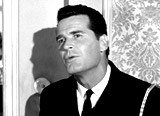
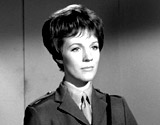
|

|
The Americanization of Emily
(1964)
Screenwriter(s): Paddy Chayefsky
 In
Praise of Cowardice, and Against the Sentimentality of the
Virtues of War In
Praise of Cowardice, and Against the Sentimentality of the
Virtues of War
To Emily's mother Mrs. Barham (Joyce Grenfell),
Lt. Cmdr. Charlie Madison (James Garner), described how he
had a "blinding revelation"
in the jungles of Guadalcanal that he was a coward:
I discovered I was a coward. That's my new
religion. I'm a big believer in it. Cowardice will save
the world. It's not war that's insane, you see. It's the
morality of it. It's not greed or ambition that makes wars.
It's goodness. Wars are always fought for the best of reasons:
for liberation or manifest destiny - always against tyranny
and always in the interest of humanity. So far this war,
we've managed to butcher some 10,000,000 humans in the
interest of humanity. Next war, it seems we'll have to
destroy all of man in order to preserve his damn dignity.
It's not war that's unnatural to us. It's virtue. As long
as valor remains a virtue, we shall have soldiers. So,
I preach cowardice. Through cowardice, we shall all be
saved...
Mrs. Barham responded: "and after this,
I'm sure all the generals will dash off and write books about
the blunders made by other generals and statesmen will publish
their secret diaries and it'll show beyond any shadow of doubt
that war could easily have been avoided in the first place.
And the rest of us, of course, will be left with the job of
bandaging the wounded and burying the dead."
I don't trust people who make bitter reflections
about war, Mrs. Barham. It's always the generals with the
bloodiest records who are the first to shout what a hell
it is. It's always the war widows who lead the Memorial
Day parades....
We shall never end wars, Mrs. Barham, by blaming
it on ministers and generals or warmongering imperialists
or all the other banal bogeys. It's the rest of us who build
statues to those generals and name boulevards after those
ministers. The rest of us who make heroes of our dead and
shrines of our battlefields. We wear our widow's weeds like
nuns, Mrs. Barham, and perpetuate war by exalting its sacrifices.
My brother died at Anzio...Yes. An everyday soldier's death,
no special heroism involved. They buried what pieces they
found of him. But my mother insists he died a brave death
and pretends to be very proud...
Now my other brother can't wait to reach enlistment
age. That'll be in September...Maybe ministers and generals
who blunder us into wars, Mrs. Barham, the least the rest
of us can do is to resist honoring the institution. What
has my mother got for pretending bravery was admirable? She's
under constant sedation and terrified she may wake up one
morning and find her last son has run off to be brave.
|
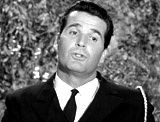
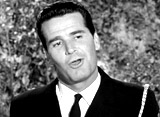
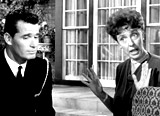
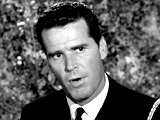
|

|
Dr.
Strangelove Or: How I Learned to Stop Worrying and Love
the Bomb (1964, US/UK)
Screenwriter(s): Stanley Kubrick, Terry Southern, Peter George
 Ultra-Patriotic
Glory Pep Talk Ultra-Patriotic
Glory Pep Talk
After receiving instructions to bomb a target
in the USSR, Major T. J. "King" Kong (Slim Pickens)
exclaimed that they were going to have "nuclear combat" with
the Russians, as he donned his ten-gallon hat:
Well, boys, I reckon this is it. Nuclear
(pronounced 'nookular') combat, toe-to-toe with the Rooskies...
To the tune of "When Johnny Comes Marching
Home," he then delivered a memorable patriotic speech
over the intercom to his B-52 crew - a parody of the totally-loyal
American sent on a glory mission:
Now look, boys. I ain't much of a hand at
makin' speeches. But I got a pretty fair idea that somethin'
doggone important is goin' on back there. And I got a fair
idea of the kind of personal emotions that some of you
fellas may be thinkin'. Heck, I reckon you wouldn't even
be human beins if you didn't have some pretty strong personal
feelings about nuclear combat.
I want you to remember one thing: the folks
back home is a-countin' on ya, and by golly, we ain't about
to let 'em down. Tell ya somethin' else. If this thing turns
out to be half as important as I figure it just might be,
I'd say that you're all in line for some important promotions
an' personal citations when this thing's over with. That
goes for every last one of ya, regardless of your race, color,
or your creed. Now, let's get this thing on the hump. We
got some flyin' to do.
|
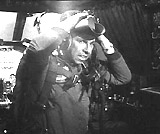
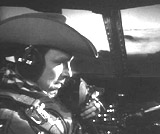
|

|
Dr.
Strangelove Or: How I Learned to Stop Worrying and Love
the Bomb (1964, US/UK)
Screenwriter(s): Stanley Kubrick, Terry
Southern, Peter George
 An
Insane Description of "Your Commie" An
Insane Description of "Your Commie"
At an alerted Burpelson Air Force Base, insane
Air Force General Jack D. Ripper (Sterling Hayden) used the
PA system from his desk with his cigar in one hand and the
phallic-looking microphone in the other. He paranoically proclaimed
the Red Alert to grim-faced guards and soldiers. After specifying
three simple rules, he then concluded with words of encouragement
and enforced loyalty:
Your Commie has no regard for human life,
not even his own. And for this reason, men, I want to impress
upon you the need for extreme watchfulness. The enemy may
come individually, or he may come in strength. He may even
come in the uniform of our own troops. But however he comes,
we must stop him. We must not allow him to gain entrance
to this base.
Now, I am going to give you three simple rules:
First, Trust no one, whatever his uniform or rank unless
he is known to you personally. Second, anyone or anything
that approaches within 200 yards of the perimeter is to be
fired upon. Third, if in doubt, shoot first and ask questions
afterwards. I would sooner accept a few casualties through
accident than lose the entire base and its personnel through
carelessness. Any variation on these rules must come from
me personally. Now men, in conclusion, I would like to say,
that in the two years that it has been my privilege to be
your commanding officer, I have always expected the best
from you, and you have never given me anything less than
that. Today, the nation is counting on us. We are not going
to let them down. Good luck to you all.
|
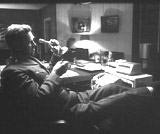
|

|
Dr.
Strangelove Or: How I Learned to Stop Worrying and
Love the Bomb (1964, US/UK)
Screenwriter(s): Stanley Kubrick, Terry
Southern, Peter George
 "I'm
Not Saying We Wouldn't Get Our Hair Mussed" "I'm
Not Saying We Wouldn't Get Our Hair Mussed"
In the War Room, General Buck Turgidson (George
C. Scott) gleefully rattled off a number of factors to President
Merkin Muffley (Peter Sellers) and other officials once US
planes had been dispatched. After predicting that the US might "suffer
virtual annihilation," he pointed to the only remaining
action he felt would be effective - attack with an all-out
nuclear offensive war against the Russians before they could
retaliate:
One: Our hopes for recalling the 843rd Bomb
Wing are quickly being reduced to a very low order of probability.
Two: In less than fifteen minutes from now, the Russkies
will be making radar contact with the planes. Three: When
they do, they are gonna go absolutely ape and they're gonna
strike back with everything they've got. Four: If, prior
to this time, we have done nothing further to suppress
their retaliatory capabilities, we will suffer virtual
annihilation.
Now, Five: If, on the other hand, we were to
immediately launch an all-out and coordinated attack on all
their airfields and missile bases, we'd stand a damn good
chance of catchin' 'em with their pants down. Hell, we've
got a five-to-one missile superiority as it is. We could
easily assign three missiles to every target and still have
a very effective reserve force for any other contingency.
Now, Six: An unofficial study [he rifled through a binder
entitled World Targets in Megadeaths], which we undertook
of this eventuality, indicated that we would destroy 90%
of their nuclear capabilities. We would therefore prevail
and suffer only modest and acceptable civilian casualties
from the remaining force which would be badly damaged and
uncoordinated.
Then, to cover his butt military-style, Turgidson
presented the President with an impossible choice between the
lesser of two evils, a reinforced or a non-reinforced attack:
Mr. President, we are rapidly approaching
a moment of truth both for ourselves as human beings and
for the life of our nation. Now, truth is not always a
pleasant thing. But it is necessary now to make a choice,
to choose between two admittedly regrettable, but
nevertheless, distinguishable post-war environments.
One, where you got 20 million people killed; and the other
where you got 150 million people killed...Mr. President,
I'm not saying we wouldn't get our hair mussed. But I do
say no more than ten to twenty million killed. Tops! Uh,
depending on the breaks.
|
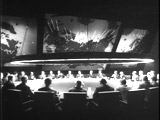

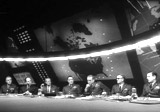
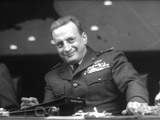
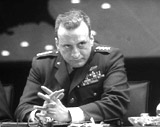
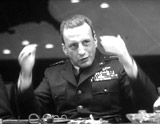
|

|
Dr.
Strangelove Or: How I Learned to Stop Worrying and Love
the Bomb (1964, US/UK)
Screenwriter(s): Stanley Kubrick, Terry
Southern, Peter George
 Checking
A Survival Kit Checking
A Survival Kit
Major Kong (Slim Pickens) checked the contents
of his survival kit with his crew on board the B-52, including
condoms, and items to barter with Russian women, to the tune
of "When Johnny Comes Marching Home":
Survival kit contents check. In them you
will find one .45 caliber automatic, two boxes of ammunition,
four days concentrated emergency rations, one drug issue
containing antibiotics, morphine, vitamin pills, pep pills,
sleepin' pills, tranquilizer pills, one miniature combination
Russian (pronounced 'Rooshan') phrase book and Bible, $100
dollars in rubles, $100 dollars in gold, nine packs of
chewin' gum, one issue of prophylactics, three lipsticks,
three pair of nylon stockin's. Shoot, a fella could have
a pretty good weekend in Vegas with all that stuff.
[Note: Originally the ending sentence was: "Shoot,
a fella could have a pretty good time in Dallas with all that
stuff" - the line was relooped in respect for Kennedy's
assassination in Dallas.] |
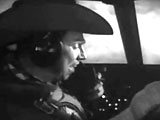
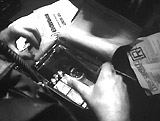
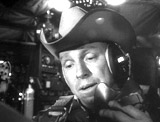
|

|
Dr.
Strangelove Or: How I Learned to Stop Worrying and Love
the Bomb (1964, US/UK)
Screenwriter(s): Stanley Kubrick, Terry
Southern, Peter George
 US
President's Telephone Conversation with the Soviet Leader
During a Nuclear Attack US
President's Telephone Conversation with the Soviet Leader
During a Nuclear Attack
President Merkin Muffley (Peter Sellers) conducted
a telephone conversation with drunken Soviet leader Dmitri
Kissov (always off-camera) about a pre-emptive US nuclear strike.
In a brilliant, memorable monologue, the self-assured President
had difficulty getting to the point while describing the critical
state of affairs in a delicate way. He spoke to the Premier
as if he were placating a juvenile:
Hello? Uh, hello? Hello, Dmitri? Listen,
I can't hear too well, do you suppose you could turn the
music down just a little? A-ha, that's much better. Yeah,
yes. Fine, I can hear you now, Dmitri. Clear and plain
and coming through fine. I'm coming through fine too, eh?
Good, then. Well then, as you say, we're both coming through
fine. Good. Well, it's good that you're fine, and - and
I'm fine. I agree with you. It's great to be fine. (Laughs)
Now then, Dmitri, you know how we've always
talked about the possibility of something going wrong with
the bomb. The BOMB, Dmitri. The hydrogen bomb.
Well now, what happened is, uh, one of our base commanders,
he had a sort of - Well, he went a little funny in
the head. You know. Just a little funny. And uh, he went
and did a silly thing.
Well, I'll tell you what he did. He ordered
his planes...to attack your country.
Well, let me finish, Dmitri. Let me
finish, Dmitri. Well, listen, how do you think I feel about
it? Can you imagine how I feel about it, Dmitri? Why do you
think I'm calling you? Just to say hello?
Of course I like to speak to you! Of
course I like to say hello! Not now, but any time,
Dmitri. I'm just calling up to tell you something terrible
has happened.
It's a friendly call. Of course, it's a friendly
call. Listen, if it wasn't friendly, you probably wouldn't
have even got it. They will not reach their targets for at
least another hour. I am, I am positive, Dmitri. Listen,
I've been all over this with your Ambassador. It is not a
trick. Well, I'll tell you. We'd like to give your Air Staff
a complete rundown on the targets, the flight plans, and
the defensive systems of the planes.
Yes, I mean, if-if we're unable to recall the
planes, then, I'd say that, uh, well, uh, we're just gonna
have to help you destroy them, Dmitri. I know they're our
boys. All right, well listen, now, who should we call? Who
should we call, Dmitri? The what, the People, you, sorry,
you faded away there. The People's Central Air Defense Headquarters.
Where is that, Dmitri? In Omsk. Right. Yes. Oh, you'll call
them first, will you? Uh, huh. Listen, do you happen to have
the phone number on you, Dmitri? What? I see. Just ask for
Omsk information.
I'm sorry too, Dmitri. I'm very sorry. All
right, you're sorrier than I am. But I am sorry as well.
I am as sorry as you are, Dmitri. Don't say that you're the
more sorry than I am because I am capable of being just as
sorry as you are. So we're both sorry, all right? All right.
|
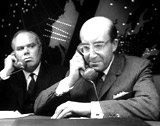
|

|
Dr.
Strangelove Or: How I Learned to Stop Worrying and Love
the Bomb (1964, US/UK)
Screenwriter(s): Stanley Kubrick, Terry
Southern, Peter George
 Insane
Talk About Fluoridation and One's Life Essence Insane
Talk About Fluoridation and One's Life Essence
Play clip (excerpt): 
Early in the film, insane Air Force General Jack
D. Ripper (Sterling Hayden) in his office at Burpelson Air
Force Base expressed suspicions to petty officer Group Captain
Mandrake (Peter Sellers) that the Communists had conspired
and polluted the "precious bodily fluids" of the
American people. A total madman with John Wayne machismo in
his locked office, Ripper feared the degradation of his bodily
fluids:
I can no longer sit back and allow Communist
infiltration, Communist indoctrination, Communist subversion,
and the international Communist conspiracy to sap and impurify
all of our precious bodily fluids.
Later, while General Ripper exchanged gunfire
with attacking troops, he continued his discussion about his
concerns with fluoridation while Mandrake was feeding the machine
gun:
Mandrake, do you realize that in addition
to fluoridating water, why, there are studies underway
to fluoridate salt, flour, fruit juices, soup, sugar, milk,
ice cream? Ice cream, Mandrake? Children's ice cream!...You
know when fluoridation first began?...1946. 1946, Mandrake.
How does that coincide with your post-war Commie conspiracy,
huh? It's incredibly obvious, isn't it? A foreign substance
is introduced into our precious bodily fluids without the
knowledge of the individual. Certainly without any choice.
That's the way a hard-core Commie works.
He first developed his theory and became aware
of the international Communist plot during a strenuous bout
of physical love-making in which he felt sexual anxiety. He
blamed his male impotency and sexual inadequacy on the Russian
conspiracy. From then on, he hoarded his bodily fluids (his "life
essence") - and kept them for himself:
I-I first became aware of it, Mandrake, during
the physical act of love...Yes, a profound sense of fatigue,
a feeling of emptiness followed. Luckily I-I was able to
interpret these feelings correctly. Loss of essence. I
can assure you it has not recurred, Mandrake. Women, er,
women sense my power, and they seek the life essence. I
do not avoid women, Mandrake. But I do deny them my essence.
|
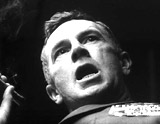
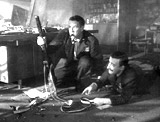
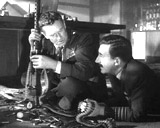
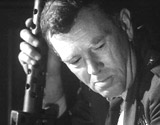
|
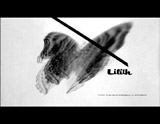
|
Lilith (1964)
Screenwriter(s): Robert Rossen, Robert Alan Aurthur (uncredited)
 Schizophrenia
and Spiders -- "They Have Been Destroyed...By Their
Own Excellence" Schizophrenia
and Spiders -- "They Have Been Destroyed...By Their
Own Excellence"
The head of Poplar Lodge institution (an insane
asylum), Dr. Lavrier (James Patterson), admired and described
the "extraordinary"
abilities of schizophrenics to his staff during an expository
lecture - although genuises, he claimed that the patients
were often unable to cope in the real world.
He said that schizophrenics usually had "seen
too much with too fine an instrument."
His words applied to beautiful, nymphomaniacal, corrupted schizophrenic
patient Lilith Arthur (Jean Seberg) in the Maryland sanitarium
- whose seductively mad pursuit of love was limitless and often
dangerous.
His speech was illustrated
by comparing a normal spider web with an asymmetrical one in
projected slides:
So many of these people have such extraordinary
minds. Such extraordinary sensibilities. Too extraordinary,
I think, sometimes. This is not a scientific theory. Maybe
it's romantic, but I often compare them to fine crystal
which has been shattered by the shock of some intolerable
revelation. I often have the feeling when I talk with them,
that they have seen too much with too fine an instrument.
That they have been close to some extreme, to something
absolute and been blasted by it. That they have been destroyed,
one might say, by their own excellence. Regarded in this
way, they are the heroes of the universe. Its finest product
and its noblest casualty.
Schizophrenia, however, is far from being
an exclusive affliction of the superior mind. As a matter
of fact, by using a substance from the blood of humans,
schizophrenia has been induced in dogs, spiders, as well
as men. As you will note, the web of most 'normal' spider
species is as distinctive and invariable as their coloring.
But the 'mad' ones spin out fantastic, asymmetrical, and
rather nightmarish designs. A most unsettling fact.
|
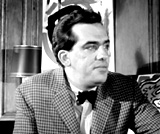
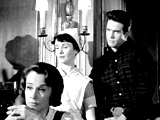

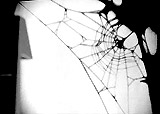
|
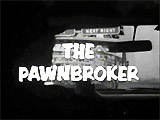
|
The Pawnbroker
(1964)
Screenwriter(s): Morton S. Fine, David Friedkin
 The
Reason for Jewish Business Acumen: A Little Brain and a Great
Bearded Legend The
Reason for Jewish Business Acumen: A Little Brain and a Great
Bearded Legend
Embittered Jewish pawnbroker Sol Nazerman (Rod
Steiger) in East Harlem, survivor of the Auschwitz concentration
camp, was asked by young Puerto Rican Jesus Ortiz (Jaime Sanchez),
his shop assistant, about Jewish business success: "So
how come you people come to business so natural." Sol
explained, becoming increasingly more angry and raising his
voice:
You people? Oh, I see. Yeah. I see. I see,
you, uh, you want to learn the secret of our success, is
that right? All right, I teach you. First of all, you start
off with a period of several thousand years, during which
you have nothing to sustain you but a great bearded legend.
Oh my friend, you have, uh, no land to call your own, to
grow food on or to hunt. You have nothing. You're never
in one place long enough to have a geography or an army
or a land myth. All you have is a little brain. A little
brain and a great bearded legend to sustain you and convince
you that you are special, even in poverty. But this,
uh, this little brain, that's the real key, you see.
With this little brain, you go out and you
buy a piece of cloth, and you cut that cloth in two and you
go out and sell it for a penny more than you paid for it.
Then you run right out and buy another piece of cloth, cut
it into three pieces and sell it for three pennies profit.
But, my friend, during that time, you must never succumb
to buying an extra piece of bread for the table or a toy
for a child, no. You must immediately run out and get yourself
a still larger piece of cloth and so you repeat this process
over and over. And suddenly you discover something. You have
no longer any desire, any temptation to dig into the Earth
to grow food or to gaze at a limitless land and call it your
own, no, no.
You just go on and on and on repeating this
process over the centuries, over and over, and suddenly you
make a grand discovery. You have a mercantile heritage! You
are a merchant. You are known as a usurer, a man with secret
resources, a witch, a pawnbroker, a sheenie, a makie and
a kike!
|

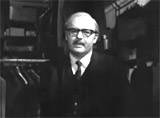
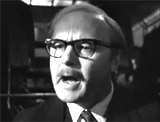
|













































